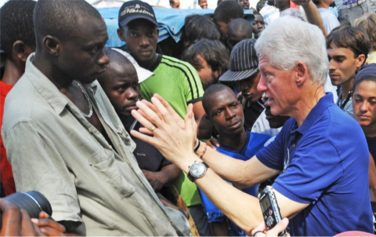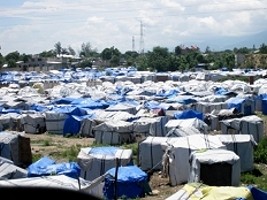With the third anniversary of Haiti’s devastating earthquake comes the inevitable focus on the relief effort that the world lavished on the Caribbean island in the quake’s aftermath.
Two opposing views occupied prominent places in the media this week. Haitian Prime Minister Laurent Lamothe wrote a piece in the Canadian newspaper The Globe and Mail thanking the citizens of Canada for their generosity in the aftermath of the storm and listing all the strides the nation has made in the past three years. But the just-published book, “The Big Truck That Went By: How the World Came to Save Haiti and Left Behind a Disaster” by former Associated Press reporter Jonathan Katz offers a depressing picture of the vast amounts of aid money that goes wasted (or stolen) and why so little seems to have been accomplished in Haiti since the quake.
“You should know that Haiti is in a better position today than it was 20 months earlier, when President Michel Martelly took office,”Prime Minister Lamothe wrote. “We still face many problems and challenges, but nearly 80 per cent of the people living in camps after the earthquake are now returning to their communities, while 95 per cent of the debris has been collected. We started rebuilding our ministries and other public administration buildings, as well as our schools and hospitals. We have launched significant programs, such as social safety nets for the most vulnerable, subsidized by the government itself, and they have already reached more than four million people in 2012.”
With the dismantling of five of the largest criminal organizations, Lamothe boasted that Haiti now has the same homicide rate as Long Beach, California.
Among the other accomplishments mentioned by Lamothe are making free primary education available to 1.27 million schoolchildren—many of them for the first time—and rebuilding the Port-au-Prince airport and upgrading three others.
“Although we are very grateful, we would prefer not being dependent on your goodwill,” Lamothe said. “What we really want, what we would prefer above all, is that your private sector invests in Haiti to create jobs that would generate much-needed tax revenue for the government. What we would prefer is that you spend your holidays in Haiti to support the tourism industry. You are welcome, and you will be safe. It will take time before our government’s vision bears fruit, and we need your help to get there.”
As for the view offered by Katz, “The Big Truck” is a harsh condemnation of the aid community. He chronicles the many ways that aid groups use the donations on questionable expenses and salaries while sending far too little to the people who need it. He also indicts many countries and groups that publicly pledged aid amounts with big numbers but never actually gave the money, including considerable amounts pledged by the U.S. that never materialized.
When companies that are based outside of Haiti are given contracts in the rebuilding effort, Katz argues, “it’s misleading to call such spending ‘money for Haiti,’ especially when it gives the impression that any Haitian could have misappropriated or even profited from it. If anything, much of the money was a stimulus program for the donor countries themselves.”


